Carl E. Olson's Blog, page 234
March 1, 2012
File under: "For what will it profit a man..."
"... if he gains the whole world and forfeits his life?", from the conclusion to an intriguing Hollywood Reporter article, "Whatever Happened To Ted Turner?":
Today, without Fonda, on some deep level Turner is alone — no matter his numerous loyalists, four girlfriends and dizzying accomplishments. It's something he regrets, and that perhaps feeds his insecurity, evidence of which comes and goes throughout our conversation.
He constantly blurts out such things as, "I pushed up against the limits of what a human being could do. And look at my accomplishments. I mean, I won the America's Cup; I won the World Series; I think I won over 1,200 prizes. I have 46 honorary degrees."
"He is very insecure," Johnson confides. "After he was named something like Time's man of the year, he held up the magazine in front of several people and said, 'See, Dad, I made it after all!'"
It's been nearly 50 years since his father died, and now Turner is starting to contemplate his own mortality. His daughter Laura says he speaks frequently of his funeral, repeatedly changing the plans — he's talked of having Willie Nelson sing "To All the Girls I've Loved Before" or having his ashes scattered over his properties or being laid out Native American-style and "having the birds pick the skin from his bones."
"Most super-achievers don't make it to 73," Turner reflects. Once virulently anti-religious, doubt rather than certainty defines his thinking now. He calls himself "a little bit religious — that says it pretty well. But I'd like to think there's somebody looking after us."
Here is the entire article. Turner's business accomplishments are immense (he essentially invented cable television and 24-hour news). His wealth is still immense ($2 billion; he was once worth five times as much). He has been married three times. He owns 28 homes and 55,000 bison. He has four girlfriends (take that, Hugh Hefner!). And he comes off as lonely, unhappy, and without any sense of what it is all about. Here's hoping that he allows the Hound of Heaven to chase him down.
Where would we be without experts? Alive!
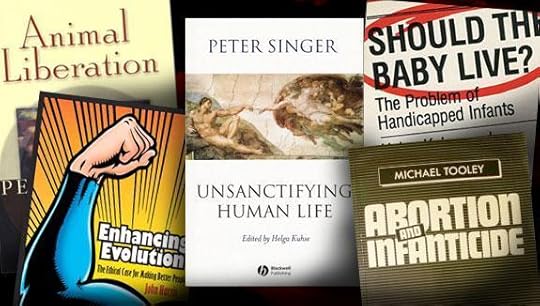
Where would we be without experts? Alive! | Carl E. Olson | Catholic World Report | Editorial
That's an exaggeration, of course, as much genuine expertise goes into all sorts of good things, from producing food to handling law enforcement to building airplane engines. But some experts—notably those perching and preening in ivory towers—are to be followed with care and even kept at a safe distance, especially if you are a newborn, as The Catholic Herald reports:
A leading British medical journal has published an article calling for the introduction of infanticide for social and medical reasons.
The article in the Journal of Medical Ethics, entitled "After-birth abortion: why should the baby live?" states in its abstract: "After-birth abortion (killing a newborn) should be permissible in all cases where abortion is, including cases where the newborn is not disabled."
The article, written by Alberto Giubilini of the University of Milan and Francesca Minerva of Melbourne University, argues that "foetuses and newborns do not have the same moral status as actual persons" and consequently a law which permits abortion for certain reasons should permit infanticide on the same grounds.
The full JME article, it appears, is available online. This passage alone should be cause for a pause or three:
The moral status of an infant is equivalent to that of a fetus in the sense that both lack those properties that justify the attribution of a right to life to an individual.
Both a fetus and a newborn certainly are human beings and potential persons, but neither is a 'person' in the sense of 'subject of a moral right to life'. We take 'person' to mean an individual who is capable of attributing to her own existence some (at least) basic value such that being deprived of this existence represents a loss to her. This means that many non-human animals and mentally retarded human individuals are persons, but that all the individuals who are not in the condition of attributing any value to their own existence are not persons. Merely being human is not in itself a reason for ascribing someone a right to life. Indeed, many humans are not considered subjects of a right to life: spare embryos where research on embryo stem cells is permitted, fetuses where abortion is permitted, criminals where capital punishment is legal.
A key assumption is that if a fetus can be aborted, then it follows that an infant can also be killed. That is not, of course, illogical at all, and those who are pro-life—including Popes Paul VI and Bl. John Paul II—have long warned that the clear road from contraceptives to abortion leads to the deadly highway of infanticide and euthanasia; the latter wrote the following in 1995, in Evangelium Vitae:
20% off Ignatius Press books (and authors) in the media

Offer ends Tuesday March 5th, 2012 at 12:00 midnight EST.
These prices are available online only through Ignatius.com
New and recently released Ignatius Press books are being featured in the media! From excerpts to interviews with authors, there is plenty to read about these great titles. Ignatius Press is offering 20% off on those books, and below are links that will take you to the various articles. Get your copy today of these newsworthy books!
Don't forget to check out our sale items. There are plenty of books, DVDs, music and more at great discounted prices!
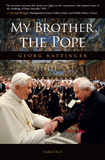 My Brother the Pope
My Brother the Pope
Georg Ratzinger, Michael Hesemann
This book is a unique window on an extraordinary family that lived through the difficult period of National Socialism in Germany. Those interested in knowing more about the early life of Benedict XVI will not be disappointed. They will also learn of the admirable character and inspiring example of the parents, and see how the Catholic faith can shape not just a family, but an entire culture-in this case, that of Bavaria. Georg's reminiscences are detailed, intimate, and warm. And while they begin with the earliest years of the Ratzinger family, they continue right up to the present day. Also available as an e-book.
My Brother, The Pope in the media:
Read an excerpt from My Brother, The Pope on ABCNews.com
Michael Hesemann, co-author of My Brother, The Pope discusses the book here.
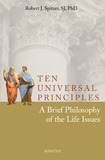 Ten Universal Principles
Ten Universal Principles
A Brief Philosophy of the Life Issues
Fr. Robert Spitzer, SJ
In Ten Universal Principles: A Brief Philosophy of the Life Issues, Jesuit Father Robert Spitzer sets out, in a brief, yet highly-readable and lucid style, ten basic principles that must govern the reasonable person's thinking and acting about life issues. A highly-regarded philosopher, Father Spitzer provides an intelligent outline for thinking and talking about human life. This book is a powerful tool for persuasively articulating and effectively inculturating a prolife philosophy. Also available as an e-book.
Ten Universal Principles in the media:
Our Sunday Visitor will be running an interview with Fr. Spitzer in its March 11 print edition. You can view the article online here.
Watch Fr. Spitzer on EWTN's "Bookmark" discussing his book.
Father Spitzer's Tips for Pro-Lifers
Article from Catholic News Agency: Priest defends pro-life movement with secular philosophy
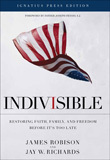 Indivisible - As seen on Fox News!
Indivisible - As seen on Fox News!
Restoring Faith, Family and Freedom Before It's Too Late
Jay Richards, James Robison
In Indivisible, Jay Richards and James Robison tackle tough moral and political issues facing Christians today, including abortion, stem cell research, marriage, education, economics, health care, the environment, judicial activism, terrorism, free trade and more. Written to appeal to a broad spectrum of believers, Indivisible provides simple, clear arguments that Christians can use to support their beliefs in public settings. This special Catholic edition of Indivisible, with a foreword by Father Joseph Fessio,S.J., is available only from Ignatius Press (and Catholic bookstores). Order now and receive a free CD by popular speaker Dave Durand, "Voting Guidelines for Catholics."
Indivisible in the media:
Here is the link to Jay Richards' recent interview with "Catholic Connection"
Here is the link to Richards' recent interview with "Currents" on NET TV.
Here is the link to Richards' recent interview with "Everyday Faith Live" on Telecare TV. The interview occurs around the 13:50 mark.
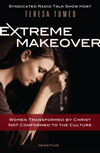 Extreme Makeover
Extreme Makeover
Women Transformed by Christ, Not Conformed to the Culture
Teresa Tomeo
Popular radio host Teresa Tomeo knows from experience that the self-image of American women is being distorted by pop culture. With its emphasis on youth, physical beauty, and sexuality, the secular media is encouraging women--and girls--to see themselves primarily as sex objects. So what are women steeped in the Hollywood and Cosmo girl version of reality to do? Undergo Tomeo's Extreme Makeover. With the help of this book, they can shed the toxic messages that objectify and enslave them and embrace the truth about being a beloved daughter of God. Also available as an e-book.
Extreme Makeover in the media:
Article from National Review: Transformational Issues
Teresa Tomeo talks with Dr. Laura
Extreme Makeover on NET TV
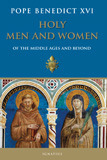 Holy Men and Women Of the Middle Ages and Beyond
Holy Men and Women Of the Middle Ages and Beyond
Pope Benedict XVI
Pope Benedict XVI continues his exploration of the greatest teachers and role models in the history of the Church with these sketches of twenty-six men and women from the Middle Ages and beyond. The collection goes beyond the Middle Ages and includes some Counter-Reformation saints, for example, Teresa of Avila, John of the Cross, and Robert Bellarmine. It concludes with a very popular saint closer to our own times who was made a Doctor of the Church by Pope John Paul II: Thérèse of Lisieux.
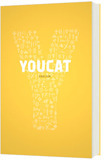 YOUCAT
YOUCAT
Youth Catechism of the Catholic Church
Christoph Cardinal Schoenborn
Developed with the help of young Catholics and written for high-school age people and young adults, YOUCAT is an accessible, contemporary expression of the Catholic Faith. The appealing graphic format includes Questions-and-Answers, highly-readable commentary, summary definitions of key terms, Bible citations and inspiring and thought-provoking quotes from Saints and others in the margins. What's more, YOUCAT is keyed to the Catechism of the Catholic Church, so people can go deeper. Also available as an e-book.
So Near and Yet So Far
by Michael J. Miller
CDF-SSPX negotiations continue in writing
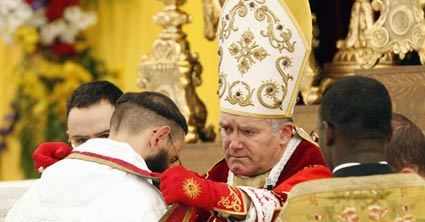 It is almost a year now since the conclusion of the theological talks between the Society of St. Pius X and the Congregation for the Doctrine of the Faith. More than five months have passed since the General Superior of that priestly society received from the Vatican dicastery a "Doctrinal Preamble" which, the CDF maintains, must be "the fundamental basis for achieving full reconciliation with the Apostolic See." What progress, if any, has taken place?
It is almost a year now since the conclusion of the theological talks between the Society of St. Pius X and the Congregation for the Doctrine of the Faith. More than five months have passed since the General Superior of that priestly society received from the Vatican dicastery a "Doctrinal Preamble" which, the CDF maintains, must be "the fundamental basis for achieving full reconciliation with the Apostolic See." What progress, if any, has taken place?
Why Study Latin and Greek?
Fr. John McDermott answers that question in a recent article in Homiletic and Pastoral Review. Hint: the answer has to do with understanding and saving western civilization.
February 29, 2012
New: "Holy Men and Women Of the Middle Ages and Beyond" by Pope Benedict XVI
Now available from Ignatius Press:
 Holy Men and Women Of the Middle Ages and Beyond
Holy Men and Women Of the Middle Ages and Beyond
by Pope Benedict XVI
Pope Benedict XVI continues his exploration of the greatest teachers and role models in the history of the Church with these sketches of twenty-six men and women from the Middle Ages and beyond.
From the start of his pontificate, the Pope has used his Wednesday audiences to present the timeless wisdom that has been expressed in the writings and lives of holy men and women down through the ages. He began with the Apostles and then moved to the Fathers of the Church. Next he presented the great Christian teachers of the late Roman Empire and the early Middle Ages. In this volume, he picks up the thread in the high Middle Ages with the inspirational St. Francis and St. Dominic, followed by some of the men and women they profoundly influenced, such as Clare, Bonaventure, and Thomas Aquinas.
The collection goes beyond the Middle Ages and includes some Counter-Reformation saints, for example, Teresa of Avila, John of the Cross, and Robert Bellarmine. It concludes with a very popular saint closer to our own times who was made a Doctor of the Church by Pope John Paul II: Thérèse of Lisieux.
The theme that unites these men and women across time is the constant need of the Church for renewal. In every generation, God raises up holy ones who challenge Christians to live as they ought-as true disciples of Christ.
Pope Benedict XVI is widely recognized as one of the most brilliant theologians and spiritual leaders of our age. As Pope he authored the best-selling Jesus of Nazareth; and prior to his pontificate, he wrote many influential books that continue to remain important for the contemporary Church, such as Introduction to Christianity and The Spirit of the Liturgy.
"We Must Not Comply", by Msgr. Kevin T. McMahon

We Must Not Comply | Msgr. Kevin T. McMahon, STD | Catholic World Report
The HHS mandate: Assessing the current situation and looking to the future
On January 20, 2012, the US Department of Health and Human Services (HHS) finalized its August 2011 mandate requiring virtually all employers to provide insurance coverage for sterilization and contraceptives, including long-lasting injections and implants, and so-called morning after pills. Depending on the circumstances, these drugs and devices can cause abortions. The mandate went a step further by effectively reversing previous exemptions to such mandates based on conscience or religious grounds.
Universal opposition
Strong opposition to the mandate was immediate. Religious leaders and Americans of all stripes correctly saw the mandate as a violation of the consciences of individuals and of the free exercise of religion guaranteed by the US Constitution. The Catholic Church, whose various entities have hundreds of thousands of employees, was at the forefront of the opposition to this unprecedented intrusion of the federal government into such matters.
While President Obama must have anticipated opposition from the US bishops and faithful Catholics, he may have been surprised to find that even the "progressive" Catholics who helped to elect him in 2008 were against the mandate. Faced with increasing opposition from conservatives and liberals, from people of faith and non-believers, and even from the secular media, the President sought to placate the opposition. He also sought to regain the support of "progressive" Catholics.
A meaningless accommodation
With the help of a trade association called the Catholic Health Association of the United States of America (CHA-USA), the Obama administration reached what it believed was a workable solution. On February 10, 2012, the President approved and confirmed the mandate, while giving religious institutions an extra year to comply with its demands. At the same time he promised that he would allow an accommodation before the date for compliance by religious institutions. This "accommodation" was simple: insurance companies, and not the religious employers, would cover these immoral practices free of charge. It was claimed that the cost of the contraceptives and sterilizations would be offset by savings associated with unwanted pregnancies that would now be avoided.
However, as common sense and cost analysis conducted by insurers concluded, this projection is absurd. There would likely be additional costs and certainly no savings. With or without increased costs, all employers will pay premiums for the entire insurance package and, therefore, be forced to provide drugs and procedures in violation of their conscientiously held beliefs.
A mixed reaction to the accommodation
The United States Conference of Catholic Bishops (USCCB) and faithful Catholics, together with thousands of other religious leaders and their congregations, restated their opposition to the mandate and to the promised "accommodation." But the President dismissed their concerns, knowing that his anti-life, anti-marriage, and anti-family policies had already permanently alienated these groups.
New: "Life Out Of Death: Meditations on the Paschal Mystery"
Now available from Ignatius Press:
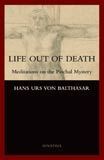 Life Out Of Death: Meditations on the Paschal Mystery
Life Out Of Death: Meditations on the Paschal Mystery
by Hans Urs von Balthasar
Death and dying are inseparably linked with life. They are self-evident and at the same time cannot be grasped by reason alone - they are ordinary, and yet so incredible. In these meditations, the acclaimed theologian Hans Urs von Balthasar investigates this great mystery. He asks about the contradiction, inherent in all men, of wishing to achieve something "imperishable in transitoriness" and gives an answer culled from the Scriptures and from the Church Fathers.
In looking at this contradiction that appears to be irreconcilable from a purely human perspective, Balthasar tries to find something in the human existence that the Christian solution can take up, for if there was nothing, one would not see how Christianity could connect to our existence at all. This starting-point becomes fully visible and effective only when the Christian interpretation itself becomes evident, otherwise it remains open to dangerous misinterpretations.
The emphasis lies in the word "mystery". The reader must meditate on these profound ideas which are demanding both in language and contents - then the reading will inspire him with insights and prospects that will, while not resolving the paradox "that everything earthly is inscribed on the sand of transitoriness", will anchor it in the Christian faith, which claims that man is eternal and that God himself became man in the person of Jesus Christ to help us attain to that eternal life.
Hans Urs von Balthasar [Ignatius Insight Author Page] is widely considered one of the greatest theologians of the twentieth century. He wrote over 60 works of theology, spirituality and philosophy, including his great trilogy: the 7 volume work The Glory of the Lord, the 5 volume work Theo-Drama, and the 3 volume work Theo-Logic. His most famous individual works include Prayer, Heart of the World, Mysterium Paschale and Cosmic Liturgy.
"So Near and Yet So Far": CDF-SSPX negotiations continue in writing

So Near and Yet So Far | Michael J. Miller | Catholic World Report
CDF-SSPX negotiations continue in writing
It is almost a year now since the conclusion of the theological talks between the Society of St. Pius X and the Congregation for the Doctrine of the Faith. More than five months have passed since the General Superior of that priestly society received from the Vatican dicastery a "Doctrinal Preamble" which, the CDF maintains, must be "the fundamental basis for achieving full reconciliation with the Apostolic See." After studying the document carefully and consulting with local SSPX superiors, Bishop Bernard Fellay sent a response to Rome on December 1. No doubt it recommended revisions to the wording of the Preamble, a process that the CDF had expressly anticipated and allowed. The CDF then wrote requesting clarification of the response, which the SSPX promptly supplied.
Despite breathless announcements since then by certain Italian Vatican watchers—who had read none of the documents they claimed to be reporting on—spokesmen for the SSPX insist that there was no "second response" (which would imply a shift in position) and no definitive rejection of the Doctrinal Preamble.
The theologians
In a departure from the strict confidentiality that had previously cloaked the CDF-SSPX negotiations, on December 2, 2011 the Italian edition of L'Osservatore Romano printed a study about the magisterial value of Vatican II written by Msgr. Fernando Ocariz of Opus Dei, one of the experts who had represented the Holy See during the CDF-SSPX theological discussions. Of course, the role of the council was and remains "A Crucial Question," as Father Jean-Michel Gleize, one of the SSPX panelists, called it in the 11,000-word reply to Msgr. Ocariz that he published in the Courrier de Rome.
These salvos were unofficial statements, explanations by theologians of positions that had long since been general knowledge, and they neither quoted the Doctrinal Preamble nor referred to it directly. Nevertheless, some who were sincerely hoping for reconciliation felt uneasy about the prospect of negotiations continuing in the red glare of publicity, for the same reason that one would rather not watch fireworks set off near a construction site.
The authorities
In late January the CDF held a routine four-day Plenary Assembly at the Vatican.
New: "Saint Helena and the True Cross" by Louis de Wohl
Now available from Ignatius Press:
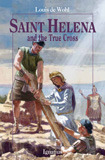 Saint Helena and the True Cross
Saint Helena and the True Cross
by Louis de Wohl
Set against the colorful background of power struggles in imperial Rome and battling Roman legions, this is the exciting story of St. Helena, mother of the Emperor Constantine, who found the Cross of Christ in Jerusalem. This book for young people paints a vivid portrait of a remarkable woman who overcame every obstacle with faith, hope, perseverance... and a healthy dose of ambition.
In this 29th book in the acclaimed Vision Books series for youth, Louis de Wohl, known for his masterful storytelling, describes the amazing events that led to the conversion of Helena and the rise to power of her son. He also recounts the vision Constantine experienced on the eve of a pivotal battle and his subsequent legalization of Christianity in the fourth century. The story dramatically concludes with St. Helena's final accomplishment-her dangerous and miraculous expedition to the Holy Land.
Louis de Wohl wrote numerous historical novels for adults, including The Living Wood, which is also about St. Helena and Constantine. He earned international acclaim for The Spear, and among his other popular titles are Lay Siege to Heaven, The Restless Flame, The Joyful Beggar and The Quiet Light.
February 28, 2012
Video of Fr. Robert Spitzer, SJ, talking about "Ten Universal Principles"...
... on EWTN's "Bookmark" with host Doug Keck, which aired this past week:
Ten Universal Principles: A Brief Philosophy of the Life Issues, by Fr. Robert J. Spitzer, S.J., was published last year by Ignatius Press and is also available in Electronic Book Format.
Food and Hydration: A Natural Law Perspective

Food and Hydration: A Natural Law Perspective | Fr. Jack Healy O. Carm. | Homiletic & Pastoral Review
Hearing about "health care proxies," "living wills," "durable power of attorney" can be somewhat baffling to the ordinary person, especially to the person of faith.1 For he or she knows that these legal instruments are meant to address end-of-life care which, owing to the advances in technology, raises not only medical but ethical issues, as well. One such issue concerns the administration of food and hydration to the terminally ill, or to the dying. I would like to address that issue within the ethical framework of natural law theory which, it is to be noted, seems to be enjoying a certain resurgence even in the legal community. In that community, two prominent names come to mind: John Finnis of Oxford, and Robert George of Princeton;2 though not to be ignored are Robert Bork, and Hadley Arkes;3 and, as we know from their confirmation hearings, Justices Scalia and Thomas.
If anything, natural law theory, with its pedigree reaching back to ancient times, is eminently rational and coherent, owing to the genius of the 13th century philosopher and theologian, St. Thomas Aquinas. Such was his systematic approach to natural law that, thereafter, no comprehensive treatment of the topic ever omits his name. In his Summa Theologica, Prima Secundae, he addresses natural law in the course of treating law as such [qss. 91-95] , and then throughout the Summa, treats other key components of the theory, like the nature of the "good," or of freedom, or of justice, or of personhood, or of a moral act. To be noted is St. Thomas' handling of specific moral issues, like that of killing in self-defense (qs.64. a.7), and that of suicide (ibidem, a.5), which yield distinctions still in play today and, as we will see, relevant for our topic on nutrition and hydration.
I believe that the lynch pin of natural law theory is found in its presupposition that every creature, according to its make-up, that is, its nature, seeks its own fulfillment. The creature strives to realize to the full what it is constitutionally. All natures below man do so instinctively. While man, with the peculiarity of a nature comprised of free will and intellect must—notwithstanding his lower functionings—choose that which will fulfill and perfect his nature. This inherent drive, or dynamism, found in a thing makes its behavior inherently purposeful which, according to Aristotle, equates with its "good." That is, relative to a thing's nature, purpose and good are synonymous, so that in achieving the purpose of its being, a thing is simultaneously realizing its good. Hence, Aristotle's definition, "good is that toward which all things aim."
Carl E. Olson's Blog
- Carl E. Olson's profile
- 20 followers



